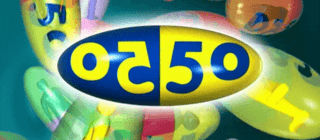50/50 (British game show) facts for kids
Quick facts for kids 50/50 |
|
|---|---|

The pill logo used from Series 2 onwards. The original logo consisted of two bubbles arranged diagonally.
|
|
| Genre | Children's game show |
| Presented by | Sally Gray (1997–2002) Angellica Bell (2003–04) Sophie McDonnell (2005) |
| Narrated by | Matthew Davies (1998–2000) Gary Martin (2001) Dave Kelly (2001–05) |
| Country of origin | United Kingdom |
| Original language(s) | English |
| No. of series | 9 |
| No. of episodes | 118 (inc. 4 Christmas specials) |
| Production | |
| Running time | 25 minutes |
| Production company(s) | BBC Scotland |
| Release | |
| Original network | BBC One |
| Picture format | 576i (4:3) (1997–2000) 576i (2001–2005) |
| Original release | 7 April 1997 – 12 July 2005 |
50/50 was a super fun British children's television game show! It aired on BBC One's CBBC block, which is a special part of the BBC channel just for kids. The show first started on 7 April 1997 and ran for 9 series, ending on 12 July 2005. If you missed it, you could still catch repeats on BBC One, BBC Two, and the CBBC channel until 2009.
The show had a few different presenters over the years. Sally Gray hosted from the very beginning until 2002. Then, Angellica Bell took over until 2004, and finally, Sophie McDonnell presented in 2005. There was also a cool computer voice named 'Flynn' who helped out. Matthew Davies was Flynn's voice from 1998 to 2000, followed by Gary Martin in 2001, and Dave Kelly from 2002 to 2005.
50/50 was a competition between two teams. Each team was made up of fifty 11- and 12-year-old students from different schools. These students were chosen randomly to take part in exciting physical games and tricky quiz rounds. The goal was to score as many points as possible! All the players also got to vote in 'true or false' questions during special observation rounds. Most of the time, both schools won prizes, but from series 5 onwards, the winning team also got a special trophy.
Contents
How the Game Show Worked
The students who were competing were also the audience in the studio! They sat in raised seats on opposite sides of the studio. They watched all the games and cheered for their teammates. At first, the two competing schools wore orange and green T-shirts to show their teams. But in the second series, in 1998, their colours changed to blue and yellow.
Choosing Contestants
A large computer named 'Flynn' helped choose the contestants. Flynn would randomly pick numbers, and each student's number was used only once. This made sure everyone had a fair chance to play!
Fun Games and Quizzes
The show was packed with different types of challenges:
- Physical Games: These often involved big, inflatable obstacle courses. Think bouncy castles and slides, but as a race! Other children's game shows like Get Your Own Back and Fun House also had similar fun challenges.
- Quiz Rounds: Teams had to answer questions to earn points.
- Observation Rounds: In these rounds, all the students got to play! They would watch a pop music video and then use keypads to vote 'true' or 'false' on questions about what they saw.
Prizes for Schools
The team that won the most points got a cool prize for their school. In later series, the winning team also received a shiny glass trophy. Plus, all the students who took part in the show received official merchandise, like souvenirs, just for being there!
Show Broadcast Dates
50/50 aired for many years. Here's a look at when each series and special episode was broadcast:
Series Dates
| Series | Start date | End date | Episodes |
|---|---|---|---|
| 1 | 7 April 1997 | 16 June 1997 | 9 |
| 2 | 6 April 1998 | 3 August 1998 | 13 |
| 3 | 12 April 1999 | 26 July 1999 | 13 |
| 4 | 3 April 2000 | 17 July 2000 | 13 |
| 5 | 2 April 2001 | 16 July 2001 | 13 |
| 6 | 15 April 2002 | 22 July 2002 | 13 |
| 7 | 8 April 2003 | 8 July 2003 | 14 |
| 8 | 6 April 2004 | 13 July 2004 | 15 |
| 9 | 5 April 2005 | 12 July 2005 | 15 |
Christmas Specials
The show also had some special episodes around Christmas!
| Date |
|---|
| 28 December 1998 |
| 26 December 1999 |
| 25 December 2000 |
| 26 December 2001 |
 | Chris Smalls |
 | Fred Hampton |
 | Ralph Abernathy |

